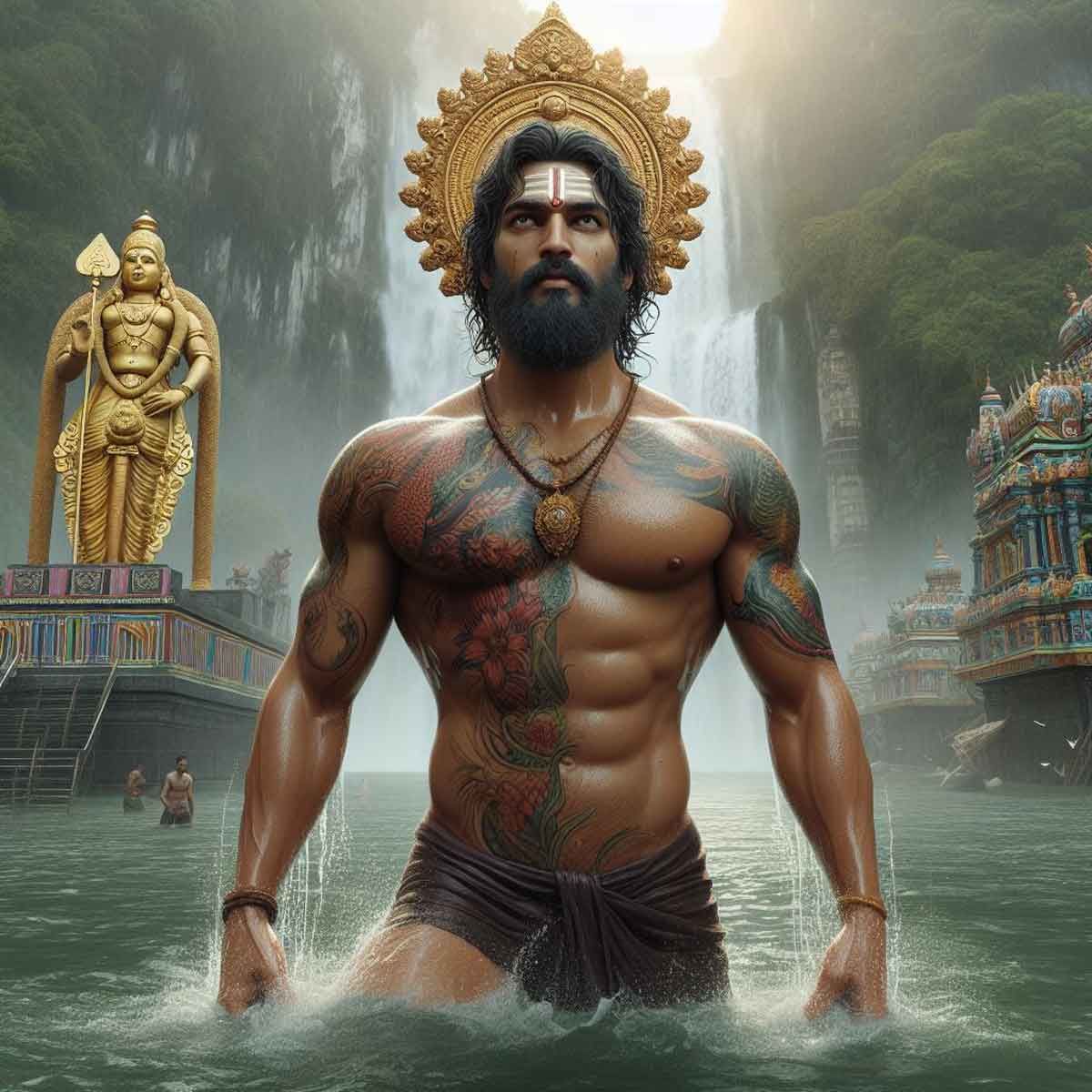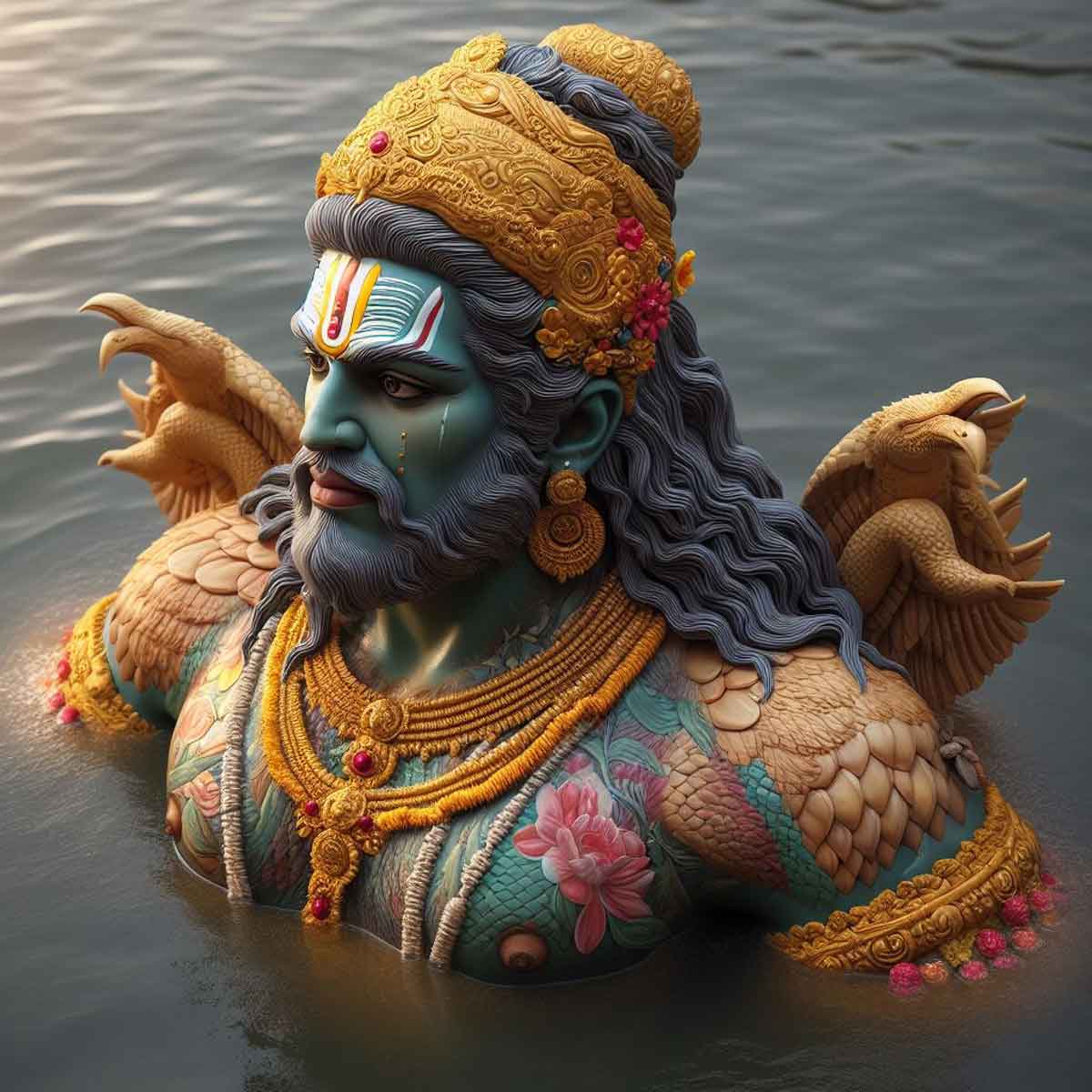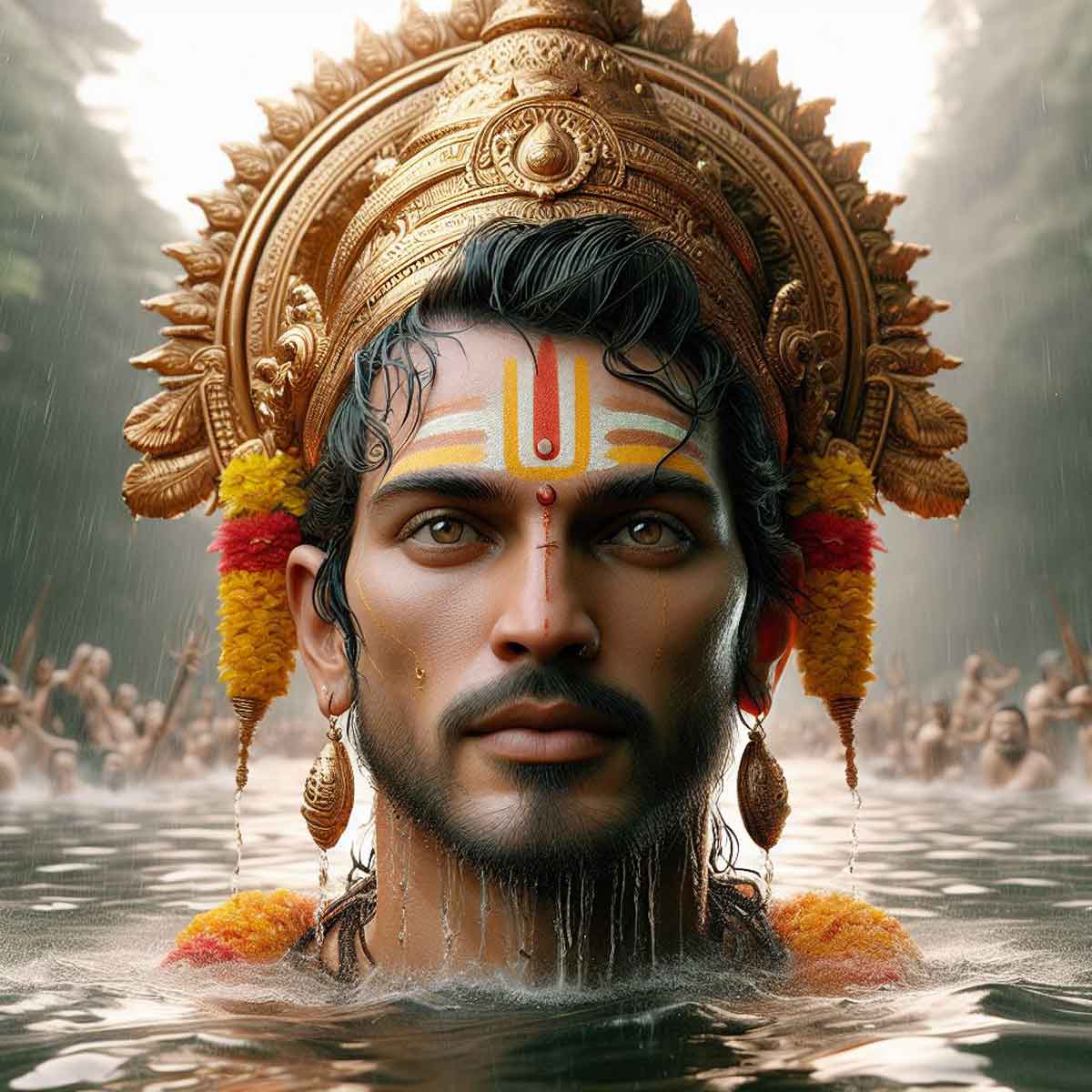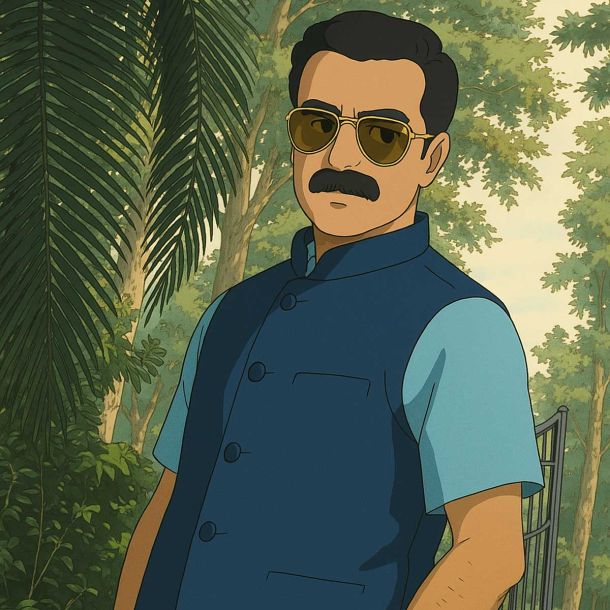More Coverage
Twitter Coverage
Satyaagrah
Written on
Satyaagrah
Written on
Satyaagrah
Written on
Satyaagrah
Written on
Satyaagrah
Written on
Join Satyaagrah Social Media
Near Tamil Nadu's Kosasthalaiyar river, few boys stumbled upon rare 12th-century Murugan idol, weighing 150kg, standing 3.5 feet tall, buried in the sand, the monumental find not only dazzles archaeologists but also heralds a profound spiritual resurgence

In an inspiring incident reminiscent of divinity's resurgence, mirroring the awakening of Bharat, a group of young boys playing by a river in Tamil Nadu made a groundbreaking discovery. "Our Gods are awakening from a long sleep, much like Bharat!" This statement, reverberating with many, heralds a revival of divine presence and faith across the nation.
|
ये संकेत है… हम जाग रहे हैं। भगवान को इंसान की भक्ति बनाए रखती है।
It signifies that it is human devotion that keeps the gods among us. The rituals of worship, the execution of rituals, and the performance of sacrificial yagnas are seen as the life force for the deities. Such practices have been integral to India's culture, serving as a guiding light for the divine, drawing them closer to their followers. This belief underscores why the asuras and danavas historically attempted to disrupt these sacred rites—to cut off the divine connection with the devout.
The remarkable find occurred along the Kosasthalaiyar River, near Thiruvalangadu in Tamil Nadu, where the boys unearthed an ancient idol of Lord Murugan. This statue is identified by archaeologists as a relic from the 12th century, making it a significant piece of history. The idol, "weighs 150 kilograms and stands 3.5 feet tall," is a majestic representation with a crown on its head, showcasing Lord Murugan in the rare and revered Brahmasastha form, with four arms and two legs.
Reverend Tahsildar Mathiyalagan, who played a pivotal role in the statue's recovery, has expressed plans for its future. The intention is to transfer it to the museum for further analysis and conservation. This initiative ensures that the idol, a symbol of the area's rich spiritual and cultural legacy, is preserved for future generations to appreciate and study.
This discovery is a momentous event in the conservation of India's ancient cultural heritage and ignites the spiritual fervor among the populace, reminding them of the enduring bond that links the divine to the human soul.
What an extraordinary find! The recent unearthing of a Lord Murugan idol near a river in Tamil Nadu has brought to light a piece of the area's vast cultural and spiritual heritage. The discovery showcases the intricate craftsmanship of ancient artisans and serves as a testament to the region's rich religious history. It's events like this that highlight the enduring connection between our ancestors' beliefs and practices and our current way of life.
The reemergence of Lord Murugan from the sands of the riverbed has sparked a renewed interest in the deity known as the God of War. This event prompts the question: Is this how Sanatana Dharma rejuvenates itself? Is it an indication that the time has come for the ancient deities to reassume their esteemed positions in a world that strays from righteousness? Such questions invite us to explore the deeper meanings behind these occurrences and what they signify for the followers of these age-old traditions.
This remarkable idol of Lord Murugan was stumbled upon by boys playing by the Thiruvalangadu river. Characterized by its unique features of four arms and two legs, the statue is an unmistakable representation of Lord Murugan. This discovery not only highlights the prevalence of Lord Murugan's worship in the region but also adds a significant piece to the puzzle of historical and religious studies.
Moreover, the identification of the idol as representing Lord Murugan in the Brahma Sastha form is particularly significant. In this form, Lord Murugan is said to have taken on the creative responsibilities typically attributed to Lord Brahma. This aspect of Lord Murugan is relatively rare and underscores the diversity and depth of representation within Hindu mythology. The Brahma Sastha manifestation emphasizes the multifaceted nature of deities in Hinduism, where gods assume various roles and responsibilities, reflecting the rich tapestry of beliefs and narratives that form the foundation of Sanatana Dharma.
This discovery is more than just an archaeological find; it is a bridge to the past, offering insights into the spiritual life and artistic achievements of an ancient civilization. It serves as a reminder of the continuous thread that links our present to a time when these deities were revered and celebrated through art, culture, and daily rituals.
After a meticulous examination by experts, the statue unearthed near the Tamil Nadu river has been tentatively dated back to the 12th century AD. This incredible find, coupled with the discovery of additional artifacts related to Lord Murugan scattered across the riverbed, suggests the thrilling possibility of an undiscovered archaeological site waiting to be explored. The atmosphere in the region is electric, with both historians and locals sharing a palpable excitement. The local community, recognizing the significance of these findings, is eagerly anticipating further exploration and conservation efforts to uncover more about their rich cultural heritage.
Lord Murugan, a deity revered across many cultures, is known by several names including Skanda and Kartikeya. Celebrated as the Senapati (commander) of the gods in their battle against the demon Tarakasur, Lord Murugan epitomizes courage, valor, and the essence of righteousness. For centuries, the Indian subcontinent, historically known as Bharatvarsh, has offered its dedicated piety at the feet of Lord Kartikeya, reflecting the deep spiritual connection and reverence held for this deity.
Historical reports and religious texts highlight that numerous temples dedicated to Lord Kartikeya, under the names Skanda or Murugan, once dotted the Indian subcontinent. Among these, the famous Kartikeya Temple in Pushkar, Rajasthan, stood as a beacon of spiritual magnificence, alongside other temples across India that celebrated the deity's glory. It is also believed that a temple dedicated to Skanda was located in Himachal Pradesh, adding to the widespread cultural footprint of Lord Murugan's worship. Over the centuries, however, many of these sacred sites have succumbed to the ravages of time, falling into disrepair or vanishing, leaving behind only faint echoes of their once resplendent existence. The discovery of the Murugan idol and artifacts rekindles interest in these historical and spiritual sites, offering a poignant reminder of the rich religious tapestry that defines the region.
 |
The Ancients Rise Again
In recent times, Bharat has witnessed a remarkable phenomenon—the re-emergence of ancient idols from the sands of time, surfacing across the nation. This wave of discoveries signals a profound moment in the spiritual landscape of the country, suggesting that the deities of Sanatana Dharma are awakening to reclaim their esteemed positions in the hearts and minds of the people. The uncovering of the Lord Murugan idol in Tamil Nadu, in particular, has sparked a wave of introspection regarding the cyclical nature of time—Kala Chakara—as envisioned in Sanatana Dharma. "As per Bhagwad Gita, Gods shall descend among the devotees to restore balance and re-establish Dharma." This profound statement prompts a tantalizing question: Is the era of Kali Yuga concluding? Are we on the cusp of welcoming a new epoch marked by righteousness and Dharma?
The rediscovery of the ancient idol of Murugan serves as a powerful beacon of the timeless legacy of Sanatana Dharma, igniting wonder and devotion among the faithful. As enthusiasts and devotees alike marvel at this significant find, it invites us to ponder the potential spiritual significance underlying such occurrences. Could the resurgence of Murugan idols be a sign of a broader awakening within Sanatana Dharma, a divine hint at the turning of the age amidst the challenges of Kali Yuga? This event, rich in symbolism, extends beyond mere archaeological interest, offering hope and inspiration for a future where the principles of Sanatana Dharma flourish not only in Bharat but across the globe.
Let the discovery of this divine artifact not just be seen as an isolated event, but as a clarion call for introspection and revival of the values and teachings that have guided countless generations. May this resurgence of ancient idols herald a brighter future, imbued with the virtues of Dharma, for Bharat and for the world at large. In these times of change, the re-emergence of Lord Murugan and other deities stands as a testament to the enduring power and relevance of Sanatana Dharma, beckoning us towards a path of righteousness and spiritual renewal.
 |
 Support Us
Support Us
Satyagraha was born from the heart of our land, with an undying aim to unveil the true essence of Bharat. It seeks to illuminate the hidden tales of our valiant freedom fighters and the rich chronicles that haven't yet sung their complete melody in the mainstream.
While platforms like NDTV and 'The Wire' effortlessly garner funds under the banner of safeguarding democracy, we at Satyagraha walk a different path. Our strength and resonance come from you. In this journey to weave a stronger Bharat, every little contribution amplifies our voice. Let's come together, contribute as you can, and champion the true spirit of our nation.
 |  |  |
| ICICI Bank of Satyaagrah | Razorpay Bank of Satyaagrah | PayPal Bank of Satyaagrah - For International Payments |
If all above doesn't work, then try the LINK below:
Please share the article on other platforms
DISCLAIMER: The author is solely responsible for the views expressed in this article. The author carries the responsibility for citing and/or licensing of images utilized within the text. The website also frequently uses non-commercial images for representational purposes only in line with the article. We are not responsible for the authenticity of such images. If some images have a copyright issue, we request the person/entity to contact us at This email address is being protected from spambots. You need JavaScript enabled to view it. and we will take the necessary actions to resolve the issue.
Related Articles
- "The art of simplicity is a puzzle of complexity": Eureka Moment - Grammatical problem that puzzled Sanskrit scholars for 2,500 years is solved by Indian student Rishi Rajpopat at Cambridge, he decoded a rule taught by the "father of linguistics", Panini
- Chipko Andolan: Cut me down before you cut them down
- “Enlightenment, and the death which comes before it, is the primary soul of Varanasi”: ‘Tent City’ being set up across the Ganges in Varanasi, Uttar Pradesh with Five-star level facilities to reduce the pressure on the tourist footfall visiting Varanasi
- Mahakal Temple in Ujjain to get expanded complex with Rs 714 crore in such a way that there will be a feeling of grandeur and divinity: Another reason for devotees to celebrate after Kashi Vishwanath corridor
- “By discovering nature, you discover yourself”: Guide Anuradha Rao at Ross Island interacts with Animals, People from all over the world come to witness it, She is also one of the lucky survivors of the tsunami that devastated Andaman & Nicobar in 2004
- PM to unveil the 'Statue of Equality' of 11th century Vaishnavite saint Ramanujacharya: World’s second-largest statue in sitting position in Hyderabad on the 40-acre sprawling premises
- The power of Sanatana Dharma and Fact Analysis of the Supernatural Fire Yogi of Tanjore
- "Culture is the widening of the mind and of the spirit": Origin of the timepiece AM and PM - Arohanam Martandasaya means the ascension (rise) of the sun, Patanam Martandasaya means the inclination of the sun
- "Aum Maheshwaraya Namaha": Salutations to the Supreme Person, the boundless Being who wields his triune power for purpose of creation, preservation, and dissolution, the indwelling Spirit within all beings and unseen director of everything
- PM Narendra Modi inaugurated the Statue of Equality of Sri Ramanujacharya and emphasized 'Progressiveness does not mean detaching from one’s roots and that there is no conflict between progressiveness and antiquity.'
- "Knowledge has to be improved, challenged and increased constantly, or it vanishes": 'Encyclopedia in Sanskrit' to be World’s Biggest Dictionary with over 10 million refs collected from 1500 Sanskrit books including Vedas, Darshana, Polity, Maths & more
- 'Preserving state’s Cultural Heritage is important so Non-Hindus in Char Dham Yatra will have to undergo verification': Uttarakhand CM Pushkar Singh Dhami after concerns raised by Hindu religious seer
- Jagannath Temple administration issues clarification on proposed sale of temple lands
- "People without knowledge of their past history, origin & culture is like a tree without roots": Assamese Bhaona - traditional art with religious messages of truthfullness & dharma, created by 6th century saint-reformer Mahapurush Srimanta Sankardeva
- "ॐ तत्पुरुषाय विद्महे महादेवाय धीमहितन्नो रुद्रः प्रचोदयात्": Ancients raising again - A dream helped in discovery of 1000 year old massive 6ft Shivalingam on auspicious day of Deepavali at Arasampalayam, TN near sangam of Amaravathy & Kudakunaaru rivers
























